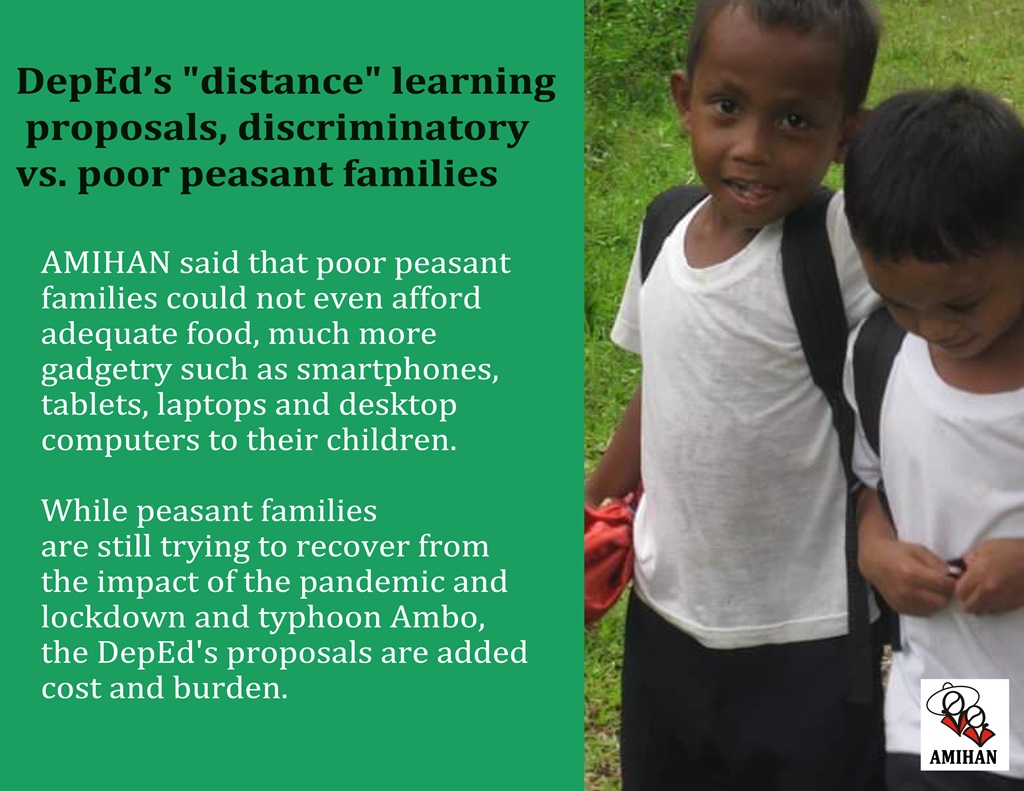Manila, Philippines – The Amihan National Federation of Peasant Women exclaimed that the Department of Education’s (DepEd) “distance” learning proposals, as alternative to “face-to-face” conduct are discriminatory to poor peasant families in the provinces and would put peasant youth-students into an disadvantaged positions once classes resume on August 24. The group released a statement after the agency’s announcement, including online learning platforms and television or radio-based instruction until a vaccine against the COVID-19 is made.
Amihan said that poor peasant families could not even afford adequate food, much more gadgetry such as smartphones, tablets, laptops and desktop computers to their children. While peasant families are still trying to recover from the impact of the pandemic and lockdown and typhoon Ambo, the DepEd’s proposals are added cost and burden.
“Pagkain nga, tipid na tipid na, paano pa makakabili ng mga gadget na kailangan para sa sistemang yan. Lumalabas na hindi angkop ang mga plano nila sa aktwal na mahirap na kalagayan ng mga pamilya at kabataang magsasaka sa bansa. Kapag itinuloy nila yan, tuluyang dadami ang out-of–school youth, at matutulak na lang magtrabaho para may makain ang kanilang pamilya,” stated by Zenaida Soriano, Amihan National Chairperson.
The group said that the education system should be based on concrete conditions of the majority of the population and not of the status of upper classes.
It added that even the providing of gadgets by the DepEd will not suffice as the poor peasant families obviously could not afford accompanying cost such as for internet connection. Many peasant families, especially in the rural outskirts still do not own television or radio sets, and even so, they are yet to be connected to the power grid.
“Kapag ipinilit ito at natulak bumili ang mga mahihirap ng mga tv, radio, cellphone at iba pa, walang ibang paraan rito kundi mangutang, na may matataas na interes. Sa kalaunan, mababaon sa utang ang pamilya, at matitigil rin ang kabataan sa pag-aaral. Malinaw na hindi sustainable at feasible ang mga proposal ng DepEd,” she said.
Likewise, based on Amihan’s research, the peasant families’ monthly cost of living reaches to around P15 to P21,000. In Cagayan, Rizal and Cavite provinces, the daily cost of living of peasant and fisherfolk families ranges from P490 to P820, which includes 2 kilos of rice, fish, vegetables, condiments, coffee, sugar, costs for allowance for schooling children, medicines and other needs.
“Kinikilala namin ang kahalagaan ng edukasyon, panawagan nga namin ang free education hanggang college at pagpapataas ng budget sa mga eskwelahan. Pero dapat maging realistic ang DepEd na napakaraming pamilya sa bansa ay mahirap. Ang dapat tutukan ng DepEd ay free mass testing sa mga kabataang estudyante dahil ito ang kagyat ngayon. Hindi babalik sa normal ang mga aspeto ng ating lipunan tulad ng edukasyon hanggang hindi nasosolusyunan ang pandemya,” Soriano ended. ###

